









 |
 |
 |
 |
||
 |
 |
 |
 |
 |
 |
| 1934 | Numbers after entries link to the list of references. |
links and notes |
| Cultural highlights | Predictions made this year | ||
| January 1 | International Telecommunications Union (ITU) is founded. | |
| January 19 | A D Blumlein makes a test recording in stereo of Sir Thomas Beecham conducting parts of Mozart’s Jupiter Symphony at EMI’s Abbey Road studios—released in mono at the time (and issued many years later in stereo). | |
| January 24 | EMI demonstrates the first workable Emitron electronic television camera. | |
| February |
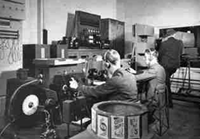 BBC opens new television studios at 16 Portland Place, London. BBC opens new television studios at 16 Portland Place, London. |
|
| March 12 | Major Baird television demonstration at Film House, Wardour Street (Gaumont-British studios) is attended by the prime minister and senior BBC officials. | |
| March | Edwin Armstrong installs an FM transmitter in the Empire State Building, New York at the request of RCA. | < 1933 > June 16 |
| March 31 | Agreement on experimental transmissions between BBC and Baird Television Company are terminated. | |
| April 19-25 | International Congress of Education Cinematographers is held in Rome under the auspices of the International Educational Cinematographic Institute of the League of Nations. [0039] | |
| April | Episcopal Committee on Motion Pictures, set up late 1933 by Catholic bishops in the US, announces its intention of mounting a crusade against immorality in films, leading to the formation of the Legion of Decency. In Philadelphia all cinemas are boycotted by Catholics. | |
| May 12 |
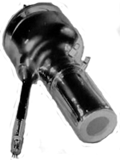 Hans G Lubszynsky and Sidney Rodda of EMI apply for a patent on the Super Emitron 'image iconoscope' television camera tube. Hans G Lubszynsky and Sidney Rodda of EMI apply for a patent on the Super Emitron 'image iconoscope' television camera tube. |
> 1937 |
| May 22 | This day is henceforth declared Broadcasting Day in Japan. | |
| June 7 | First evidence is taken by the Selsdon Inquiry to decide on which television system to adopt for UK. | |
| June 7 | Donald Duck first appears in a Walt Disney cartoon called The Wise Little Hen. | |
| June 16> | Armstrong broadcasts 70 miles in FM from Empire State Building in New York to Long Island. | < March |
| June 19 | US Communications Act establishes the Federal Communications Commission (FCC) to replace the Federal Radio Commission. The Act specifically forbids the FCC from censoring broadcasts or planned programmes. It also requires broadcasters to give equal air time to candidates standing for election. The first chairman is Eugene O Sykes. | > 1948 |
| June 26 | First full-cast complete ballet, The Gods Go A-begging, is performed on BBC television. | |
| June | New South Wales Inquiry into the Film Industry investigates the vertical integration of the Australian film industry and relations between distributors and exhibitors, including the practices of blind and block booking. Its recommendations include a distribution and exhibition quota for Australian films. | > 1935 September |
| July 1 | Federal Communications Commission (FCC) replaces the Federal Radio Commission. | See June 19 |
| July 1 | First whole body X-ray photograph is taken at Rochester, NY. | |
| July 11 | First seven (all male) commissioners of the Federal Communications Commission (FCC) are appointed. | |
| July 15 | In the face of strong campaigning by the Catholic League of Decency against immorality in films, the MPPDA (Hays Office) sets up the Production Code Administration Office, headed by Joseph Breen. Member producers of films released without certification could be fined up to $25,000. | |
| August 8 |
 Bing Crosby makes the first recordings for the new Decca Record Company in the US, founded by Jack Kapp with backing from English stockbroker E R Lewis, who also controls the British Decca company. Discs by big nameartists—including the Mills Brothers, Arthur Tracy ('The Street Singer'), the Dorsey Brothers, Fletcher Henderson and Glen Gray's Casa Loma Orchestra—sell at 35 cents, compared with the 75 cents of Brunswick, Columbia and Victor. Bing Crosby makes the first recordings for the new Decca Record Company in the US, founded by Jack Kapp with backing from English stockbroker E R Lewis, who also controls the British Decca company. Discs by big nameartists—including the Mills Brothers, Arthur Tracy ('The Street Singer'), the Dorsey Brothers, Fletcher Henderson and Glen Gray's Casa Loma Orchestra—sell at 35 cents, compared with the 75 cents of Brunswick, Columbia and Victor. |
|
| August | Fernseh again demonstrates an intermediate film television system in which the time delay has been reduced to seven seconds. | < 1933 > December 12 |
| | In the context of the depression years the major US record companies introduce cheap 35-cent labels for lesser known artists—Columbia's Okeh and RCA Victor's Bluebird. The American Record Company, parent of 75-cent Brunswick, issues records on Melotone, Perfect and Vocalion at 25 cents. | |
| late summer | 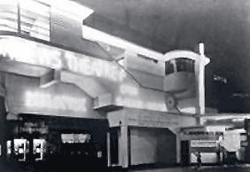 Capitol and Provicnial Cinemas opens the Waterloo Station News Theatre in London. Seating 248, it is designed in English Moderne ('art deco') style by Alistair McDonald, who also designed the similar cinema at Victoria Station. Capitol and Provicnial Cinemas opens the Waterloo Station News Theatre in London. Seating 248, it is designed in English Moderne ('art deco') style by Alistair McDonald, who also designed the similar cinema at Victoria Station. |
It closes on 14 March 1970 |
| September | RCA Victor introduces its Duo Jr record player that connects an electrically-driven turntable and magnetic pick-up to a radio set. It sells for $16.50 but is heavily promoted at 'giveaway' prices in conjunction with multiple record purchases. | |
| October 5 | First US radio network show to originate from Hollywood is Hollywood Hotel on CBS. | |
| October | At a meeting convened by Grace Goodhue Coolidge, wife of the US president, a coalition of 35 US national organisations is formed to protest at film distributors' practice of block booking. Earlier in the year, five Bills had been introduced in Congress to ban block and blind booking. | |
| late | 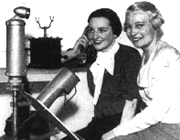 German Reichspost begins daily experimental television broadcasts from the Berlin-Witzleben transmitter, introduced by the first television announcer, Ursula Patzschke [left in the picture]. The other female announcer is Annemarie Beck. Receivers produce a, almost square picture of 23cm x 26cm. German Reichspost begins daily experimental television broadcasts from the Berlin-Witzleben transmitter, introduced by the first television announcer, Ursula Patzschke [left in the picture]. The other female announcer is Annemarie Beck. Receivers produce a, almost square picture of 23cm x 26cm. |
|
| November | Catholic Legion of Decency is founded on a permanent basis in US as a pressure group on film morality. | |
| November | Standards for 35mm positive and negative films are adopted in US by the Society of Motion Picture Engineers. | |
| December 12 | Rolf Mφller of Fernseh AG applies for a German patent for a continuous film recording system to capture television images from the face of a cathode ray tube. | < August > 1935 |
| end | Alexander Korda leases Worton Hall Studios at Isleworth, west London for £35,000 a year. During the year Korda acquires a stake in United Artists through a deal with Douglas Fairbanks Snr. | |
| | Eastman Kodak starts to add rem-jet anti-halation backing to its motion picture film stocks to reduce the flare caused by internal reflection of the camera parts. | |
| | Bell & Howell makes its first 8mm film projectors. | |
| | First film camera with battery-operated motor, Midas 9.5mm, is made in England. It also serves as projector. | |
| | Direzzione Generale per la Cinematografia is founded to co-ordinate all Italian film production. | |
| | Dave and Max Fleischer develop a stereoptical animation process to position cel-animation cartoon characters in front of three-dimensional models. | |
| | Mitchell BNC 35mm film camera is introduced, although it is not produced in quantity for another five years. The camera incorporates internal blimping (sound-proofing) instead of the cumbersome external blimps used previously. | |
| | Use of the 'Oscar' nickname for the Academy Awards is started by Hollywood gossip columnist Sidney Sklosky in connection with the 'best actress' award to Katharine Hepburn. | > 1939 |
| | The number of film production companies in Germany has fallen to 49, of which 24 are linked to Tobis-Klangfilm. | |
| | Fox-British Pictures leases Wembley Studios. [0019] | |
| | Newly refurbished Whitehall Studios at Elstree is renamed Consolidated Film Studios. One of the first productions to start shooting there is Alexander Korda’s science-fiction classic Things To Come. [0019] | |
| | French production company Gaumont-Franco-Film-Aubert is saved from bankruptcy by a French government loan. | |
| | Bombay Talkies film company is founded by Himansu Rai (see 1926, 1933) and Devika Rani. | |
| | First sound films produced in Bulgaria: A Song of the Balkan Mountains, directed by Peter Stoychev. Chile: Norte y Sur (North and South), directed by Jorge Dιlano. Iran: Dokhta Lor, directed by Abdol Hoseyn Sepenta. Morocco: Itto, directed by Jean Benoit-Levy—the country’s first feature film. |
|
| | 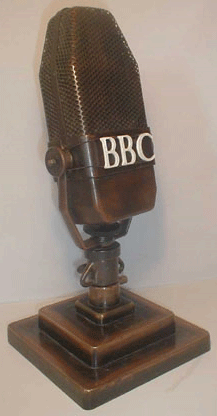 BBC-Marconi ribbon microphone, designed by BBC engineer F W Alexander, is introduced.Its angle of acceptance is about 120 degrees at front and back with a dead area of about 60 degrees on either side. It sells for around £9, compared with £40 for a moving-coil microphone. It remains in use by the BBC until 1959. BBC-Marconi ribbon microphone, designed by BBC engineer F W Alexander, is introduced.Its angle of acceptance is about 120 degrees at front and back with a dead area of about 60 degrees on either side. It sells for around £9, compared with £40 for a moving-coil microphone. It remains in use by the BBC until 1959. |
|
| | Christopher Stone joins Radio Luxembourg on a £5,000-a-year contract to present record programmes and is barred from broadcasting on the BBC. | > 1937 |
| | Watts direct-disc recording equipment is introduced. | |
| | Albion Truphonic Sound System is developed by Scottish Film Productions of Glasgow and installed in a number of cinemas. | |
| | First machine for recording radio using steel tape is developed in Germany by C Lorenz Company. | |
| | Edison Bell of England develops the Visiogram system of recording television. The device uses ordinary film to record video signals in the form of a ‘sound’ track. | [Performance was apparently very poor.] |
| | Wavelengths of European broadcasting stations are altered to conform to the Lucerne Committee recommendations. | |
| | Italy establishes an Arabic broadcasting service, Radio Bari. | |
| | Radio penetration of US homes reaches 50 per cent. | |
| | Spending by British firms on advertising on continental commercial radio stations during the year is £30,000.[0061] | > 1935 |
| | Imperial & International Communications becomes Cable & Wireless. | |
| | Marconi-Wright wireless facsimile transmission system is introduced by Cable & Wireless between the UK and Australia. | |
| | Marconi-EMI Television Company is incorporated in the UK. | |
| | The Radio Times, the BBC's programme listings journal, becomes the UK's largest selling periodical with a circulation of 2m. It retains this position until 1993. | |
| | By now Radio Normandie's English-language schedule extends to four hours on weekdays (11:30-12:00, 16:30-18:00 and 23:00) and 10 hours on Sundays (10:00-12:00, 14:00-18:30 and 21:30-01:00). | Radio Normandy |
| | British research into aircraft location by radio, which leads to the invention of radar, begins. | |
| | ‘High-fidelity’ is used as a phrase for the first time in advertising sound recording. | |
| | Grisgby-Grunow Company, in liquidation, sells its Columbia Phonograph Company to the American Record Company, owner of the Brunswick label. ARC pays $70,500 for the brand name, catalogue, Bridgeport pressing plant and affiliation with the European Columbia. |
Page updated 7 November 2010
© David Fisher